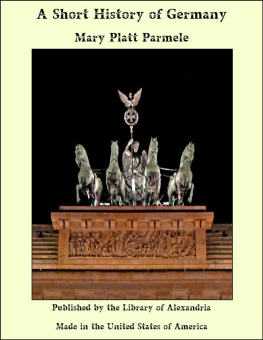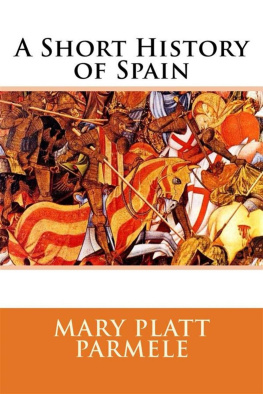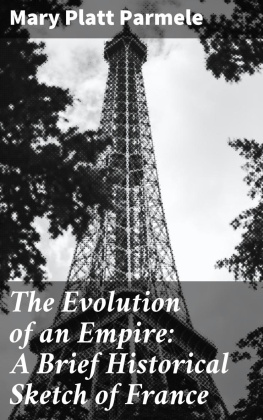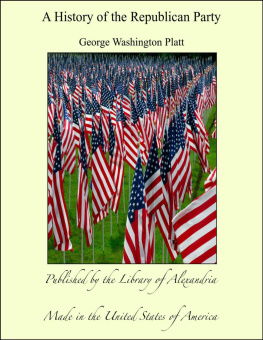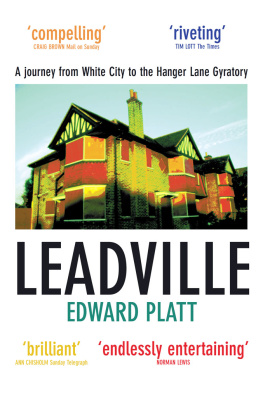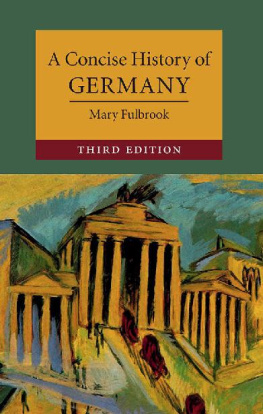A SHORT
HISTORY OF GERMANY
BY
MARY PLATT PARMELE
NEW YORK
CHARLES SCRIBNER'S SONS
1898
COPYRIGHT, 1897, BY
MARY PLATT PARMELE
COPYRIGHT, 1898, BY
CHARLES SCRIBNER'S SONS
BY THE SAME AUTHOR
A SHORT HISTORY OF THE UNITED STATES
A SHORT HISTORY OF ENGLAND
A SHORT HISTORY OF FRANCE
A SHORT HISTORY OF GERMANY
A SHORT HISTORY OF SPAIN
PREFACE.
It is more important to comprehend the forces which have created a great nation, and the progressive steps by which it has unfolded, than to know the multitudinous events and incidents which have attended such unfolding.
In order to forestall criticism for the absence of some events in this History of Germany the author desires to say, that there has been an effort to keep strictly to the main line of development and to resist the temptation of introducing details which do not bear directly upon such line.
The bypaths of history are fascinating, but they are of secondary importance, and may better be explored after the main road has been traveled and is thoroughly known.
Such is the ideal which has been very imperfectly followed in this book.
M. P. P.
NEW YORK, June 21, 1897.
CONTENTS.
Indo-European MigrationsDivisions of the Aryan Family into European RacesThe Teutonic Race
HermannDefeat of VarusCharacteristics of the Ancient Germans
Social ConditionsForm of GovernmentThe Goth in RomeA Gothic Kingdom in SpainThe Teuton Race Covering the European SurfaceThe Angles and Saxons in Britain
UlfilasThe Hunnish InvasionThe Roman Empire PerishingIts ConversionAn Eastern EmpireIncreasing Power of the ChurchCharlemagneFrance and Germany SeparatedFeudal System
Early ConditionsHungarian InvasionsCreation of BurgsKnighthoodPope and Emperor Become RivalsHenry IV.CanossaFirst HohenstaufenWelf and WaiblingenThe CrusadersConradFrederick Barbarossa
Source of Weakness in the EmpireThe Great InterregnumThe Nibelungen LiedThe Hanseatic LeagueThe GuildsMeistersingers
ConditionsFirst Hapsburg and First HohenzollernSwiss FreedomIntellectual AwakeningThe Golden BullHussite WarA Hohenzollern Receives a Mortgage on the Territory of BrandenburgDiscovery of GunpowderConditions Existing under Frederick III.Invention of PrintingThe Passing of the Old and Coming of the New
General European ConditionsCentralizing Tendencies at WorkMaximilian I.A New WorldThe Rise of SpainIsabellaCharles IV.
Triple Game between Francis I., Henry VIII., and Charles IV.Leo X.LutherThe Diet of WormsProtestantism BornMargrave of Brandenburg Usurps Sovereignty over PrussiaThe Peasants WarThe Augsburg ConfessionCharles V. ThwartedProtestantism a Dominant Power in his EmpireSchisms in the New FaithCalvinismReformersLutheransThe Schmalkaldian LeagueAnabaptistsAbdication of Charles V.Philip II.Death of CharlesFerdinand I.Council of TrentSociety of Jesus
A Protestant GermanyA Divided ProtestantismTrue Meaning of the StruggleUnfruitful WaitingThe RenaissanceMusic, Art, Letters, Born AnewThought AwakenedCopernicusGalileoKeplerImpending CalamityProtestant Union and Catholic LeagueThirty Years' War CommencedWallensteinGustavus AdolphusHis Triumph and DeathRichelieuDeath of WallensteinPeace of WestphaliaDivision of Territory
Romano-Germanic Empire PerishingEuropean ConditionsLouis XIV.Decay of National SpiritRise of BrandenburgCombination against Louis XIV.Spanish SuccessionUnder Frederick I. Brandenburg Becomes PrussiaAlliance with EnglandMarlborough and Prince EugeneBlenheimPeace of UtrechtTerritorial ChangesCharles XII. and Peter the GreatPragmatic SanctionFrederick William I.Stirrings of Thought in this Time of ChaosBirth of German Speculative PhilosophySpinozaSoul Awakening
Frederick the GreatHis ChildhoodVon Katte's ExecutionFrederick at PotsdamFrederick II., King of PrussiaMaria Theresa, EmpressWar of Austrian SuccessionSilesiaPersonal Traits of the Two SovereignsFrederick Joins France against AustriaPeace of DresdenFrederick Becomes "The Great"Healing the Wounds Left by Two WarsVoltaire's InfluenceFrederick a Reformer and a DespotGrowth in Thought and Birth of a Native LiteratureVoltaire at Frederick's CourtChange Wrought by a Nearer View of King and Poet
War over American Boundary between England and FranceMaria Theresa Joins FranceHer PolicyA Combination against Frederick II.Seven Years' WarPeace of HubertsburgSilesia Forever Abandoned by AustriaPrussia One of the "Five Great Powers"Healing Wounds AgainConditions External and Internal
Marie Antoinette Married to the French Dauphin LouisUnsuspected ConditionsJoseph II.Reforms by a Progressive Hapsburg are a FailureRomanticism Replaces Sentimentalism in LiteratureSturm und Drang PeriodLuther's Influence upon LettersFrederick Succeeded by his NephewEffect of Prussia's Ascendancy in the German EmpireIts Coming DissolutionWhy Patriotism Could Not ExistThe Calm before the Hurricane
The Beginnings of the StormThe United States of America and FranceThe Thought-Currents Which Moved toward a VortexExecution of King and QueenFrance a Ruin but FreeA RepublicFirst CoalitionPoland and its PartitionAustria Fighting Alone for the EmpireNapoleon Bonaparte in ItalyHis Methods and Their ResultTreaty of Campo FormioThree New RepublicsNapoleon in EgyptHis ReturnSecond CoalitionDominions of Ecclesiastical Rulers Given AwayNapoleon the Instrument of Fate
Napoleon Emperor of the FrenchThird CoalitionPrussian NeutralityThe RheinbundDissolution of the Empire and Abdication of Francis II.Retribution for PrussiaBattle of JenaPeace of TilsitA Continental BlockadeMarriage with Marie Louise
Revolt of Bavarian PeasantsThe "League of Virtue"Invasion of RussiaBurning of MoscowRetreatGeneral York Leads a Popular MovementPrussia at War with NapoleonThe Battle of LeipzigThe Allies in ParisNapoleon DeposedLouis XVIII. KingReturn of NapoleonWaterloo and St. Helena
ReconstructionThe Act of UnionSentiment of the PeopleConcessionsFrancis II. DiedA Republic in FranceBlaze of Revolutionary Fires in EuropeA National Parliament GrantedIts FailureNapoleon III. in FranceMagenta and SolferinoRevolution in ItalyVictor Emmanuel KingWilliam I. King of Prussia
King William and BismarckSchleswig-HolsteinProposed DivisionWar against AustriaKniggrtzThe North German Union
Napoleon III. Plans the Overthrow of Prussian DominionVacant Throne in SpainA Hohenzollern CandidateBenedetti and King WilliamWar Declared by FranceMetzSedanKing William at VersaillesCrowned Hereditary Emperor of the German EmpireDeath of Emperor William I.Emperor FrederickHis Unfulfilled Dreams and his DeathWilliam II. Emperor
A SHORT HISTORY OF GERMANY.
CHAPTER I.
Foundation building is neither picturesque nor especially interesting, but it is indispensable. However fair the structure is to be, one must first lay the rough-hewn stones upon which it is to rest. It would be much pleasanter in this sketch to display at once the minarets and towers and stained-glass windows; but that can only be done when one's castle is in Spain.
Would we comprehend the Germany of to-day, we must hold firmly in our minds an epitome of what it has been, and see vividly the devious path of its development through the ages.
The German nation is of ancient lineage, and indeed belongs to the royal line of human descent, the Aryan; its ancestral roots running back until lost in the heart of Asia, in the mists of antiquity.
The home of the Aryan race is shrouded in mystery, as are the impelling causes which sent those successive tides of humanity into Europe. But we know with certainty that when the last great wave spread over Eastern Europe, or Russia, about one thousand years before Christ, the submergence of that continent was complete.

